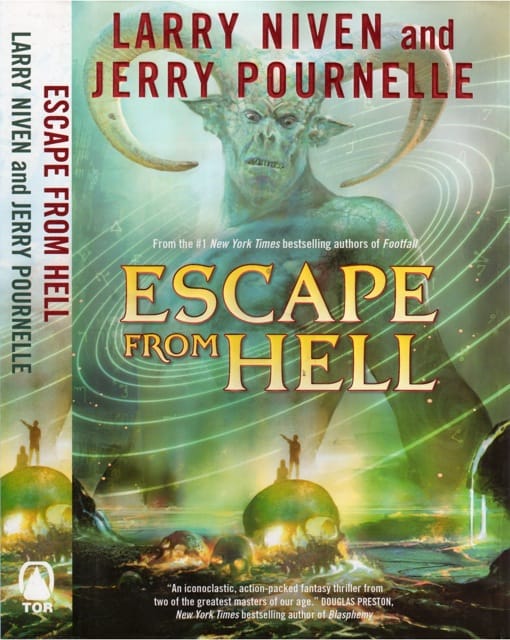The Long View 2006-01-05: 666 as a Date; Predatory Democracy; Other People's Felonies; While Earth Slept
An always timely reminder that democracies pursue wars for venial ends as much as just ones.
666 as a Date; Predatory Democracy; Other People's Felonies; While Earth Slept
The Year 1666 was full of portents for contemporary religious fanatics, such as Isaac Newton. The Great Fire of London; the Apostasy of Shabbatai Zvi; the outbreak of the Russian Raskol: the list could be extended. Newark, New Jersey, was founded in the same year. This year we have another such date: the sixth day of the sixth month of the sixth year of the century, a date that will read "06-06-06" both in Europe and America. Already signs are appearing:
AMSTERDAM — More weddings than normal are being planned for 6 June in the Netherlands this year, apparently because of the reference in the Bible to 666 as the 'Number of the Beast'.
Of course, as far as I know, no one has actually said they are planning a wedding for this reason. As the report also notes:
One explanation for the enthusiasm for the date is that it is easy to remember: 6-6-6.
Occams' Razor cuts again, perhaps.
* * *
That Spengler derides Victor Davis Hanson in Spengler's latest column at Asia Times, in which he takes issue with Hanson's reading of Athenian political culture and Hanson's attempt to apply that reading to events today:
In the minds of democracy fanciers, Athens still represents the foundation stone of Western civilization, the model for the United States' founding and, by extension, the solution to the problems of today's Middle East...The trouble is that Athenian democracy committed suicide during the 27-year-long war with Sparta.
We should remember that Athenian democracy was not destroyed by the Peloponnesian War: it underwent a revival in the next century. My recollection is that a lot of the old constitution continued to function even in Macedonian and Roman times, though Athens was no longer an independent power. Nonetheless, That Spengler has a point when he says that the behavior of Athens at its height does not support the theory of the democratic peace, and neither do some episodes in American history:
The contemporary Greek historian Thucydides also was troubled. He explains precisely why democratic Athens voted for an attack upon the Sicilian city of Syracuse, also a democracy: the Athenian mob wanted loot...I want Bush to forget about Middle East democracy and deliver a military ultimatum to Iran. Democracy does not necessarily promote peace and stability...Democratic America resolved to make war upon Mexico in 1846 in order to seize territory for the expansion of slavery, [Ulysses S. Grant] Grant observed...[I]f the demos is cruel, corrupt and rapacious, democracy will yield dismal results. In the case of the Southern demos of 1861, it was necessary to change its composition by first exterminating a whole generation of young men.
This really should not be a surprise. Pirate ships in the 17th and 18th centuries were generally democracies. So are barbarian war bands in most times and places. If you are interested in looting in person, in fact, democracy is probably the ideal way to organize the enterprise. All the participants are motivated to fight and to do their best, because the fight gives each of them the opportunity to become rich. The question is whether democracy supports group-on-group predation at every level of size and sophistication.
Immanuel Kant thought not. His idea of a war was an 18th-century "cabinet war" of the sort that was so familiar in Germany before its unification. The decision to go to war would be made by the king and his cabinet, often for reasons that had no bearing on the well-being of his subjects. After the wars of the Reformation, these conflicts were not very devastating and were conducted with small, professional armies. Cabinet wars did often require oppressive taxes. Kant believed that no sane body of taxpayers would fund a typical cabinet war if they were consulted about it. He describes with derision the behavior of monarchs who declare war and then carry on with their ordinary amusements.
The distinction between belligerency in Classical democracies and in the modern world is that, in ancient times, war was often a business enterprise from which the participants could hope to benefit directly. (This was true even under the Roman Empire, whose soldiers hoped for booty in addition to their regular salaries.) As a rule, this has not been the case in the democracies that grew out of the Enlightenment. There were exceptions: the filibustering Americans who founded Texas really were in the position of the army of Alcibiades, but apparently with better leadership. The matter becomes more doubtful in connection with the Mexican-American War: the US inherited the strategic position of the Republic of Texas as well as its debt. I don't think it applies at all to the Civil War, though. There were Confederate leaders who dreamed of a Latin American empire, but the Army of Northern Virginia fought to keep the Yankees on the nether side of the Potomac.
In the Middle East today, democracy would probably work more in the Kantian than in the Houstonian fashion. Wars in the region (with the exception of the Israeli War of Independence) are experienced by the populations involved as pure cost. Both sides often lose. Even a republic of demons would avoid war in such a case.
* * *
One no longer reads the New York Times every day, but when one does, one notes that the editorial page has wholly succumbed to Krugman Disease. Yesterday's editorial, "On the Subject of Leaks," decries the attempts by the Justice Department to find out who told the Times about the secret but presumptively legal cross-border wire-tapping that the National Security Administration began after 911:
Given the Bush administration's appetite for leak investigations (three are under way), this seems a good moment to try to clear away the fog around this issue
The Times revs up its wind-machine by distinguishing any leaks that patriotic citizens might have disclosed to the paper from the underhanded smear campaigns of the Bush Clique:
The longest-running of the leak cases involves Valerie Wilson, a covert C.I.A. operative whose identity was leaked to the columnist Bob Novak.. The question there was whether the White House was using this information in an attempt to silence Mrs. Wilson's husband, a critic of the Iraq invasion, and in so doing violated a federal law against unmasking a covert operative,
Has anyone suggested that the White House was trying to "silence" Mrs Wilson's husband? The underlying issue here was whether he was sent to Africa on a fact-finding mission because he was a trusted expert or because he was the husband of a woman who had been working at Langley for six years. As for the statute about disclosing the identity of covert agents, the special prosecutor has moved on to the metaquestion of whether his investigation into the possibility of violations of the statute may have produced violations of other laws.
These are matters of fact, not opinion. Does anyone edit this paper anymore?
* * *
Disturbing news from NASA:
Rob Suggs of Nasa's Marshall Space Flight Center in Huntsville, US, was testing a new 10-in telescope and video camera assembled to monitor the Moon for space strikes. ...On 7 November, his first night using the telescope, he observed one... "People just do not look at the Moon anymore," said Dr Suggs, of Marshall's engineering directorate.
We are not monitoring the moon? Have we learned nothing from 911?
* * *
A note to publishers: I am in need of a day job. If you think I could make myself useful, please contact me here. I volunteer to try to save the Times, hopeless though the project may appear.
Copyright © 2006 by John J. Reilly



Comments ()